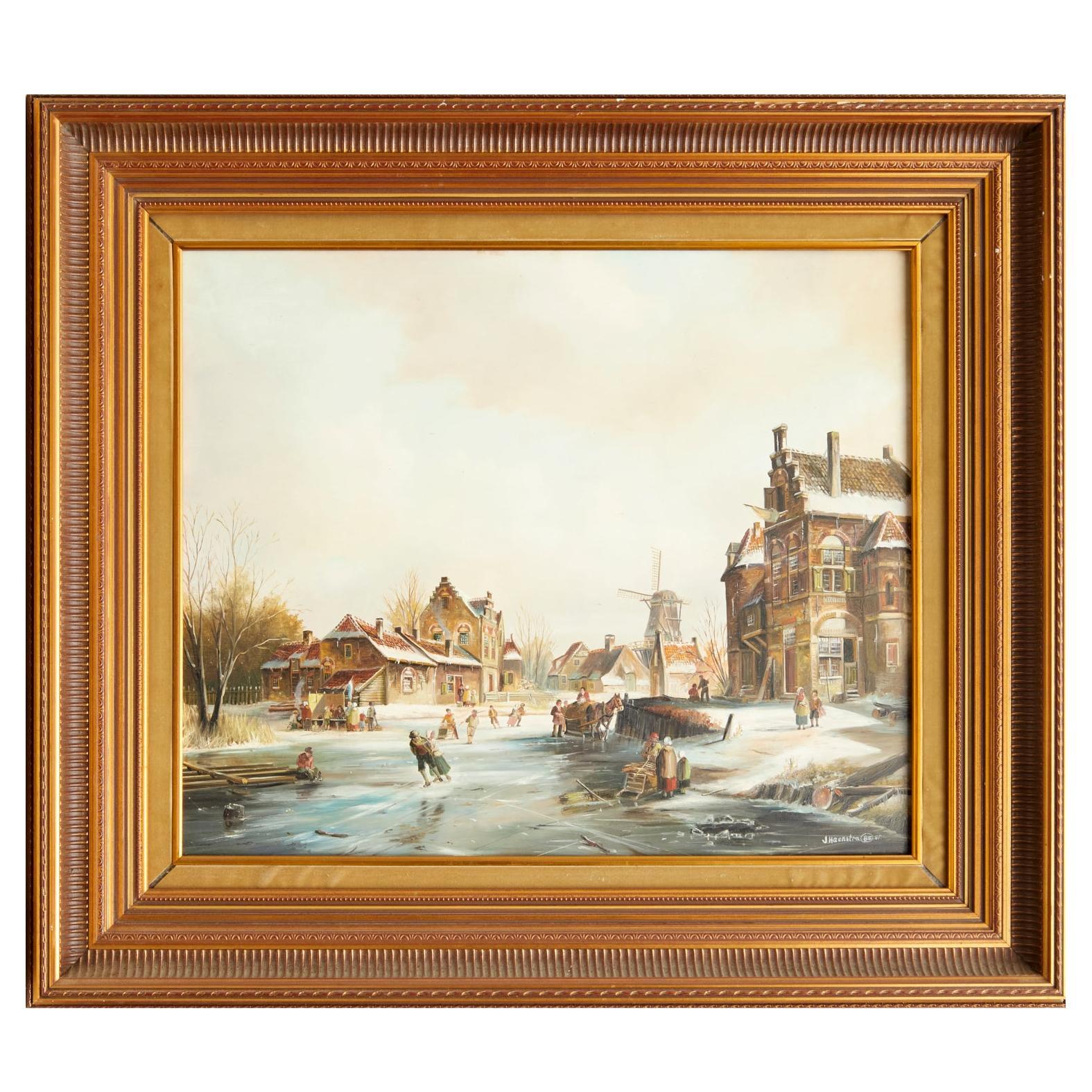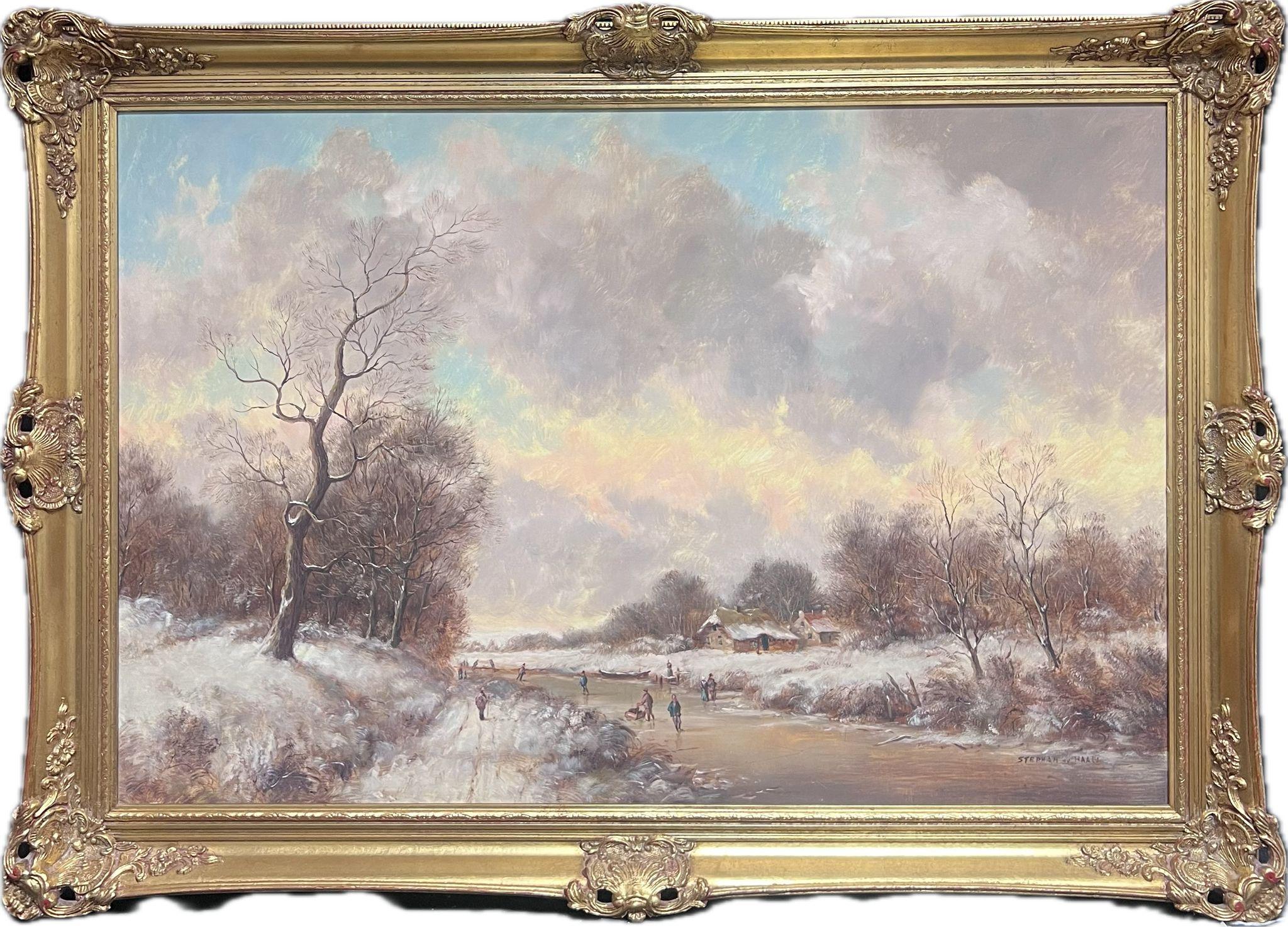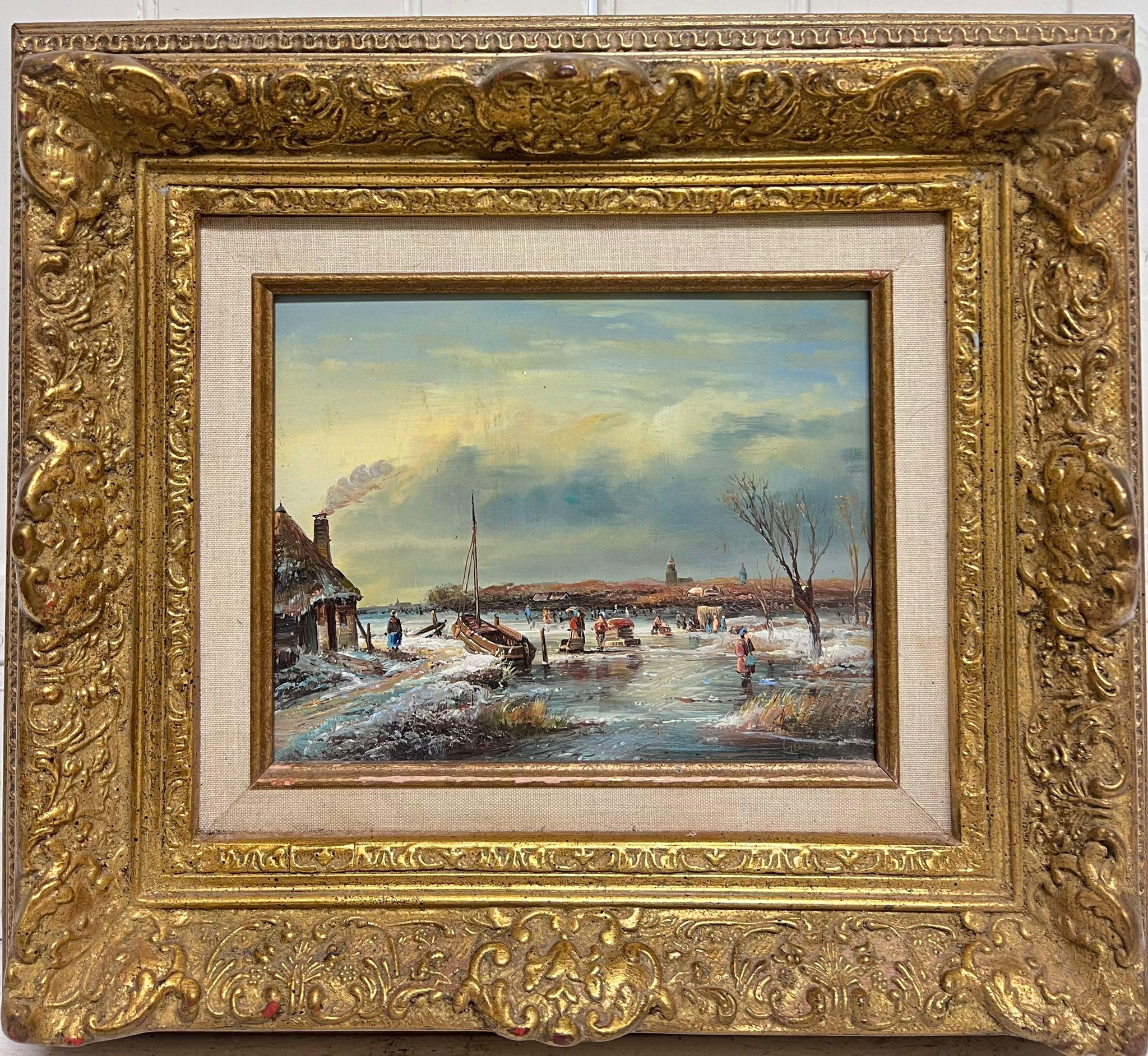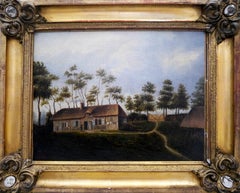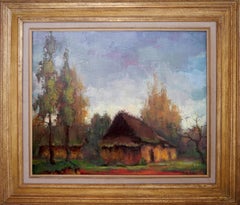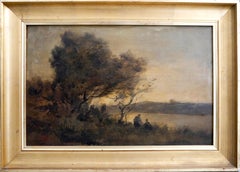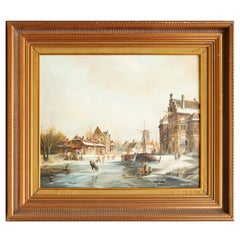Items Similar to 19e century Holland school Winter scene Oil painting Signed
Want more images or videos?
Request additional images or videos from the seller
1 of 12
French School Masters19e century Holland school Winter scene Oil painting Signed
$624.51
$2,882.3778% Off
£459.95
£2,122.8678% Off
€520
€2,40078% Off
CA$849.60
CA$3,921.2478% Off
A$944.09
A$4,357.3678% Off
CHF 494.72
CHF 2,283.3078% Off
MX$11,577.63
MX$53,435.2278% Off
NOK 6,309.81
NOK 29,122.1878% Off
SEK 5,936.03
SEK 27,397.0878% Off
DKK 3,958.68
DKK 18,270.8378% Off
Shipping
Retrieving quote...The 1stDibs Promise:
Authenticity Guarantee,
Money-Back Guarantee,
24-Hour Cancellation
About the Item
➡️Winter scene⬅️
Watercolor from Johannes Franciscus HOPPENBROUWERS (1819-1866) (see wikipedia)
⭐Structural Analysis⭐
This painting depicts a winter scene in a rural village, possibly in the Netherlands or a similar European setting. The composition is well-balanced, featuring:
A central building with a distinctive thatched roof covered in snow, creating a focal point.
A frozen river or canal, with a person ice skating in the middle ground, adding movement and human presence.
A windmill and houses in the background, reinforcing a Dutch setting.
Figures engaged in daily life, such as the man near the building carrying a walking stick and a bag, adding a narrative element.
The overall scene is tranquil yet lively, capturing a nostalgic winter atmosphere.
⭐Color and Light⭐
The palette consists of muted earth tones, including warm browns, ochres, and soft grays, giving a rustic and aged appearance.
The sky has an orange-yellow hue, possibly representing a sunrise or sunset, casting a gentle glow over the cold landscape.
Shadows and highlights in the snow are subtly executed, using grays and blues to create depth.
The contrast is not overly strong, suggesting an overcast or hazy winter day.
The light distribution enhances the sense of depth, drawing the viewer’s eye from the foreground to the distant windmill.
The painting exhibits a semi-realistic approach, blending realism with a slightly impressionistic touch in the handling of textures.
Fine details are visible in architectural elements (such as wood panels and doors) and in the snow-covered vegetation.
The brushwork varies between controlled strokes for buildings and looser strokes for trees and the sky, creating a dynamic yet harmonious effect.
Perspective is well-managed, as the frozen canal and receding buildings create depth and lead the viewer’s eye into the distance.
The painting may belong to the Dutch winter landscape tradition, which was popularized by artists such as Andreas Schelfhout (1787–1870) and Charles Leickert (1816–1907).
Winter landscapes were a significant genre in Dutch Golden Age painting, continuing into the 19th century with Romantic influences.
Technique: watercolour on paper 32x20cm / 12.6x7.9 inch
With a frame; 52x41cm /20.5x16.1 inch
⏩It is signed HOPPENBROUWERS⏪
⭐Condition : ⭐-Nice watercolor. Ready to hang. Few scratch on the wooden frame
⭐Provenance:⭐ Private collection - France. (Shipping from France is fast 4-6 days.)
- Creator:French School Masters (French)
- Dimensions:Height: 7.88 in (20 cm)Width: 12.6 in (32 cm)Depth: 0.4 in (1 cm)
- Medium:
- Movement & Style:
- Period:
- Condition:
- Gallery Location:Zofingen, CH
- Reference Number:Seller: Hoppenbrouwers1stDibs: LU2203216050622
About the Seller
5.0
Platinum Seller
Premium sellers with a 4.7+ rating and 24-hour response times
Established in 2019
1stDibs seller since 2022
570 sales on 1stDibs
Typical response time: 4 hours
- ShippingRetrieving quote...Shipping from: La Baule, France
- Return Policy
Authenticity Guarantee
In the unlikely event there’s an issue with an item’s authenticity, contact us within 1 year for a full refund. DetailsMoney-Back Guarantee
If your item is not as described, is damaged in transit, or does not arrive, contact us within 7 days for a full refund. Details24-Hour Cancellation
You have a 24-hour grace period in which to reconsider your purchase, with no questions asked.Vetted Professional Sellers
Our world-class sellers must adhere to strict standards for service and quality, maintaining the integrity of our listings.Price-Match Guarantee
If you find that a seller listed the same item for a lower price elsewhere, we’ll match it.Trusted Global Delivery
Our best-in-class carrier network provides specialized shipping options worldwide, including custom delivery.More From This Seller
View AllFrench School Landscape BARBIZON Oil painting Signed
Located in Zofingen, AG
➡️Rustic Cottage in a Woodland Clearing⬅️
This painting, signed simply 'Adam,' appears to be the work of an artist closely associated with the Barbizon school—a movement that emerge...
Category
1830s Tonalist Figurative Paintings
Materials
Gesso, Canvas, Oil, Stretcher Bars
$450 Sale Price
75% Off
19th Century French School Landscape BARBIZON Oil painting Signed
Located in Zofingen, AG
➡️Rustic Cottage in a Woodland Clearing⬅️
☀️Subject & Setting☀️
A thatched-roof cottage sits in a clearing surrounded by dense, slender trees with soft foliage.
A winding dirt path ...
Category
Early 1800s Tonalist Landscape Paintings
Materials
Canvas, Oil, Stretcher Bars
$444 Sale Price
79% Off
French School Impressionist Rural Landscape Signed oil painting
Located in Zofingen, AG
➡️Vivid Landscape⬅️
⏩It is signed R Dufils, probably Roland Dufils (1920-1973) Paris 7th ⏪
Roland Dufils was a French painter born in Maromme, a commune in the Normandy region of F...
Category
Early 1900s Tonalist Figurative Paintings
Materials
Gesso, Canvas, Oil, Stretcher Bars
French school Landscape river scene Signed
Located in Zofingen, AG
➡️ Beautiful study Landscape⬅️
Title: Sur les bords du Loing (Seine et Marne France) Jean Baptiste Camille Corot
Medium: Oil on canvas
Period: Likely mid-19th century
Framing: A wid...
Category
1850s Tonalist Figurative Paintings
Materials
Gesso, Canvas, Oil, Stretcher Bars
$132,108 Sale Price
26% Off
20th Century French School Luminous Landscape Oil painting Signed Oauc
Located in Zofingen, AG
Luminous beautiful landscape.
It's a landscape from Barbizon school. Probably inspired by Caspar David Friedrich, known for his landscapes seeking to tend towards the magnificent,...
Category
Early 20th Century Barbizon School Landscape Paintings
Materials
Canvas, Oil
$540 Sale Price
85% Off
French school The River Oil painting Signed
Located in Zofingen, AG
➡️The River from Rousseau⬅️
"Il est tombé par terre, C'est la faute à Voltaire, Le nez dans le ruisseau, C'est la faute à Rousseau" - He fell to the ground, It's Voltaire's fault, H...
Category
1890s Tonalist Figurative Paintings
Materials
Gesso, Canvas, Oil, Stretcher Bars
$600 Sale Price
79% Off
You May Also Like
Antique Dutch Style Signed Oil Painting on Board – Winter Landscape Genre Scene
Located in Palm Coast, FL
Medium: Oil on wood
Date: 19th-20th Centuries
Style: Dutch Romantic / Hague School influence
Subject: Winter landscape with church, village figures, cottages
Frame: Original ornate g...
Category
Early 20th Century Dutch School Landscape Paintings
Materials
Oil
Vintage Dutch Style Winter Landscape Oil Painting – Signed Martin – Canvas
Located in Palm Coast, FL
This original vintage oil painting on canvas is a beautiful example of Dutch-style winter landscape art, inspired by the Dutch Golden Age and the 19th-century Romantic revival.
Sign...
Category
Late 20th Century Impressionist Landscape Paintings
Materials
Oil
Large Framed 20th Century Dutch School Winter Scene, John Haanstra, Oil on Board
Located in Morristown, NJ
John Haanstra (Dutch, b. 1940), signed and dated 1985 on lower right. A charming oil painting, showing a winter landscape. Skaters are enjoying seasonal fun on a frozen canal while others go about their daily activities. A typical Dutch windmill can be seen in the background. Typical Dutch style housing can be seen in the foreground. The sky seems to be laden with more snow, creating the sense of more winter fun...
Category
Vintage 1980s Dutch Modern Paintings
Materials
Wood, Paint
Vintage oil painting on canvas, Winter Landscape, Village, figures. Framed
Located in Palm Coast, FL
This delightful winter landscape painting portrays a quaint rural village scene set along a frozen river or pond, likely in the 19th century. The composition is centered around a gro...
Category
20th Century Impressionist Landscape Paintings
Materials
Oil
$472 Sale Price
20% Off
Classical Dutch Winter Scene Figures Large Oil Painting Signed & Gilt Framed
Located in Cirencester, Gloucestershire
Classical Dutch Winter Scene
signed, 20th century
oil on canvas, framed
canvas: 22.5 x 30 inches
framed: 24 x 36 inches
provenance: private collecti...
Category
Mid-20th Century Old Masters Landscape Paintings
Materials
Oil
Fine Dutch Winter Ice Landscape Figures playing Ice Signed Oil Gilt Swept Frame
By Johnny Gaston
Located in Cirencester, Gloucestershire
Winter Landscape
by Johnny Gaston (British b. 1955)
signed oil on board, framed
framed: 16.75 x 17.5 inches
board: 10 x 12 inches
provenance: private col...
Category
20th Century Dutch School Landscape Paintings
Materials
Oil
More Ways To Browse
French 19th Century Masters
Antique French Door Handles
Dutch Golden Age Painting
Antique School Doors
French 19th Century Architectural Drawings
Snow Painting Shadow
Canal French Painting
Dutch Village Painting
Antique Cold Frame
Winter River Scene
Dutch Oil Painting River
Dutch Windmill
1816 Painting
Dutch Winter Landscape Paintings
Dutch Oil Paintings Winter
Windmill Oil Paintings
Antique 6 Panel Doors
Dutch Watercolor 19th Century
